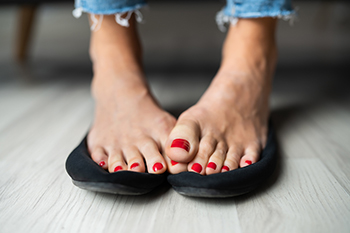
Excessive sweating, termed hyperhidrosis, occurs when individuals sweat profusely without apparent reasons such as heat or physical exertion. The two types of hyperhidrosis are focal hyperhidrosis, localized to specific body parts like the feet, and generalized hyperhidrosis, affecting the entire body due to potential medical issues. Regular sweating is the body's natural cooling mechanism during heat or exertion, whereas excessive sweating may be due to idiopathic hyperhidrosis, a hereditary condition with unknown causes. Certain medical conditions and medications can also be culprits. While not directly harmful, hyperhidrosis can impact an individual's emotional well-being and social interactions, and lead to conditions like eczema. Diagnosis involves an evaluation. Managing hyperhidrosis includes maintaining hygiene, wearing breathable fabrics, and drinking ample water. If your feet sweat excessively, it is suggested that you make an appointment to see a podiatrist who can evaluate your specific condition and offer appropriate treatment options.
If you are suffering from hyperhidrosis contact one of our podiatrists of Jill Einhorn, DPM and James Einhorn, DPM. Our doctors can provide the care you need to attend to all of your foot and ankle needs.
Hyperhidrosis of the Feet
Hyperhidrosis is a rare disorder that can cause people to have excessive sweating of their feet. This can usually occur all on its own without rigorous activity involved. People who suffer from hyperhidrosis may also experience sweaty palms.
Although it is said that sweating is a healthy process meant to cool down the body temperature and to maintain a proper internal temperature, hyperhidrosis may prove to be a huge hindrance on a person’s everyday life.
Plantar hyperhidrosis is considered to be the main form of hyperhidrosis. Secondary hyperhidrosis can refer to sweating that occurs in areas other than the feet or hands and armpits. Often this may be a sign of it being related to another medical condition such as menopause, hyperthyroidism and even Parkinson’s disease.
In order to alleviate this condition, it is important to see your doctor so that they may prescribe the necessary medications so that you can begin to live a normal life again. If this is left untreated, it is said that it will persist throughout an individual’s life.
A last resort approach would be surgery, but it is best to speak with your doctor to find out what may be the best treatment for you.
If you have any questions please feel free to contact our offices located in Brooklyn and Astoria, NY . We offer the newest diagnostic and treatment technologies for all your foot and ankle needs.